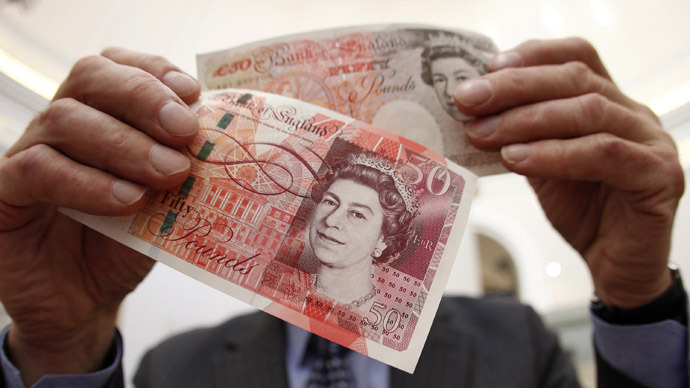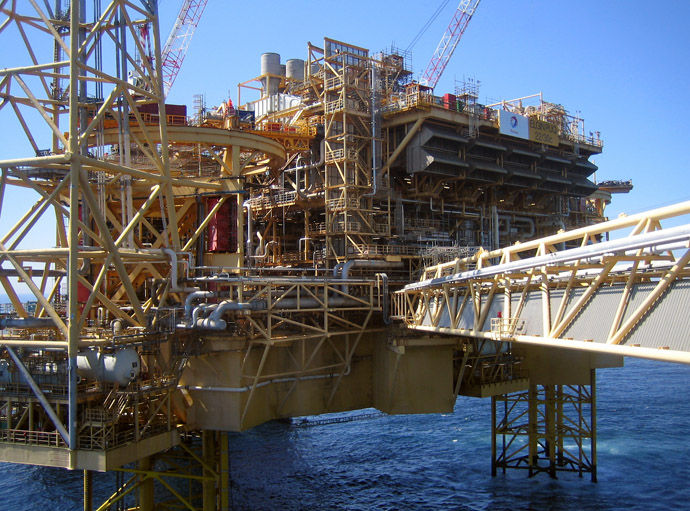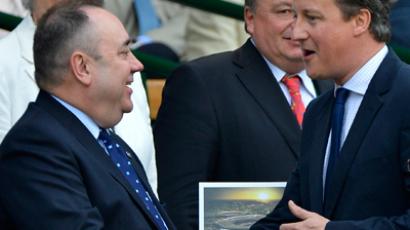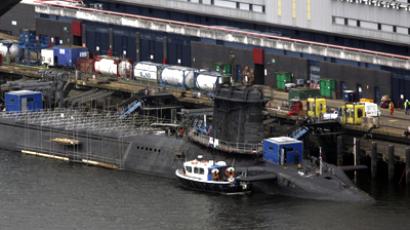Independent Scotland could lose the pound

Scotland wants to keep sterling as its national currency if it achieves independence from the United Kingdom, but a British finance ministry report says there is ‘no clear reason’ for the UK to share its currency with an independent Scotland.
Relying on first hand Euro experience, the British Treasury
announced on Tuesday they would not enter a formal currency
agreement with an independent Scotland, which will hold a
referendum in September 2014 to decide whether to split from the
UK.
Westminster has already made it clear it does not support
Scotland breaking away, and now the Treasury has issued a warning
that an independent Scotland could endanger their currency.
Chancellor George Osborne said it would be a ‘dive into uncharted
waters’ speaking in Glasgow, where he was meeting with Chief
Secretary to the Treasury, Danny Alexander on Tuesday.
If Scotland stays with the pound, it would put the UK finance
sector at risk, with little liability, according to Osborne.
“Why would 58 million citizens give away some of their
sovereignty over monetary and potentially other economic policy
to five million people in another state?” said Osborne.
"If Scotland wants to keep the pound, the best way they could
do that would be to stay in the United Kingdom,” Osborne
told BBC radio.
The Scottish Greens, a political faction, accused Osborne and
Finance Secretary John Swinney of waging a phony war.
"Osborne's economic credibility is in tatters and now he's
attempting to wage a phony war by suggesting we're doomed unless
we stick with the existing arrangements,” Patrick Harvie,
co-convener of the Scottish Greens, wrote on the party’s website.
“The sharing of the pound between an independent Scotland and
the rest of the U.K. is the common-sense position supported by
the Fiscal Commission,” Scottish Finance Secretary John
Swinney said in the statement. “A sterling zone is also in
the overwhelming economic interests of the rest of the U.K. every
bit as much as it is in the interests of Scotland.”
Most recent opinion polls show around 30% of Scots are in favor
of independence, while 50% are opposed.

Euro as a case study
The currency threat from London comes a week after Fitch
downgraded the UK economy from AA+ to AAA, which prompted
incoming Bank of England Governor Mark Carney to label Britain as
a ‘crisis economy’
After the downgrade there is ‘no economic rationale’ for the UK
to share their currency, according to the finance report.
Ministers are worried Scotland could be the UK’s version of
Italy, Spain, Portugal or Greece- an economic burden. Osborne and
the finance ministry worry the currency pairing would make the UK
susceptible to a euro-style currency crisis.
Scotland’s First Minister, Alex Salmond, says his country will be
fiscally independent even if they stay with the pound.
In recent years the Scottish government has maintained a surplus
while the UK’s debt has doubled, nearing £1.5 trillion, according
to the Scotland Times. The Treasury report stated
Scotland’s economy would be no larger than New Zealand’s, which
has a GDP of about $142 billion.
There have been many proposals within the independence movement
to establish their own currency and escape the wrath of the euro,
and start a sovereign coin, like Iceland and Denmark.
Iceland’s GDP ($14 billion) is a fraction of Scotland’s, and it
currently runs its own currency, but is considering a move to the
euro. Iceland’s currency is regulated, and not free-floating, an
alternative Scotland would pursue if it coins its own currency.
Denmark has a GDP of about $333 billion, and like Scotland, is
abundant in natural and renewable resources.
"The recent experience of the euro area has shown that it is
extremely challenging to sustain a successful formal currency
union without close fiscal integration and common arrangements
for the resolution of banking sector difficulties," the UK
finance report said.

Scotland independence 'market neutral'
A Scottish state will have a ‘neutral’ effect on markets, according to international ratings agency Fitch. The currency union could, however, pose market dangers to both nations, the report cautions.
Both Scotland and Britain could suffer economically if Scotland decides to exit the pound after a few years of independence, or, if the market decides the commitment by each state isn’t strong enough.
Another hang up is the governing bank. Presently the Bank of England is the primary lender for Scottish Banks, and therefore, Britain would insist on ‘rigorous oversight’ of fiscal policies.
"All of the alternative currency arrangements would be likely to be less economically suitable for both Scotland and the rest of the UK,” the report says.
Whose oil is it?
Other ‘uncharted waters’ that are at the epicenter of the independence movement are those of the North Sea, and the oil and natural gas potential they hold.
If Scotland becomes a sovereign state, it would, under
international continental shelf law, receive rights to the North
Sea. The reserves are projected to be between 15 billion and 24
billion barrels of oil: 30-40 years of production, according to
the BBC.
In its first 'Oil and Gas Analytical Bulletin', Scotland predicts
production in new sovereign waters could generate as much as £57
billion in tax revenue by 2018.
The North Sea oil shelves, according to the UK, are on the
decline- Scotland is cooking the books. Real futures only total
around £33, according to independent economists at the Office for
the Budget Responsibility, the Telegraph reported.
Exploration is still ongoing in the North Sea, but output
production is heavily dependent on oil prices. If prices remain
low, production is less profitable, but if prices spike, so will
production, as its more profitable.
Dividing North Sea oil geographically would leave the UK with
only 9% of reserves, but according to an October 2012 note by
international credit agency Fitch, this outcome is unlikely.
Fitch predicts another compromise would have to be reached,
possibly based on a per capita division, which would give the UK
92% of reserves.














